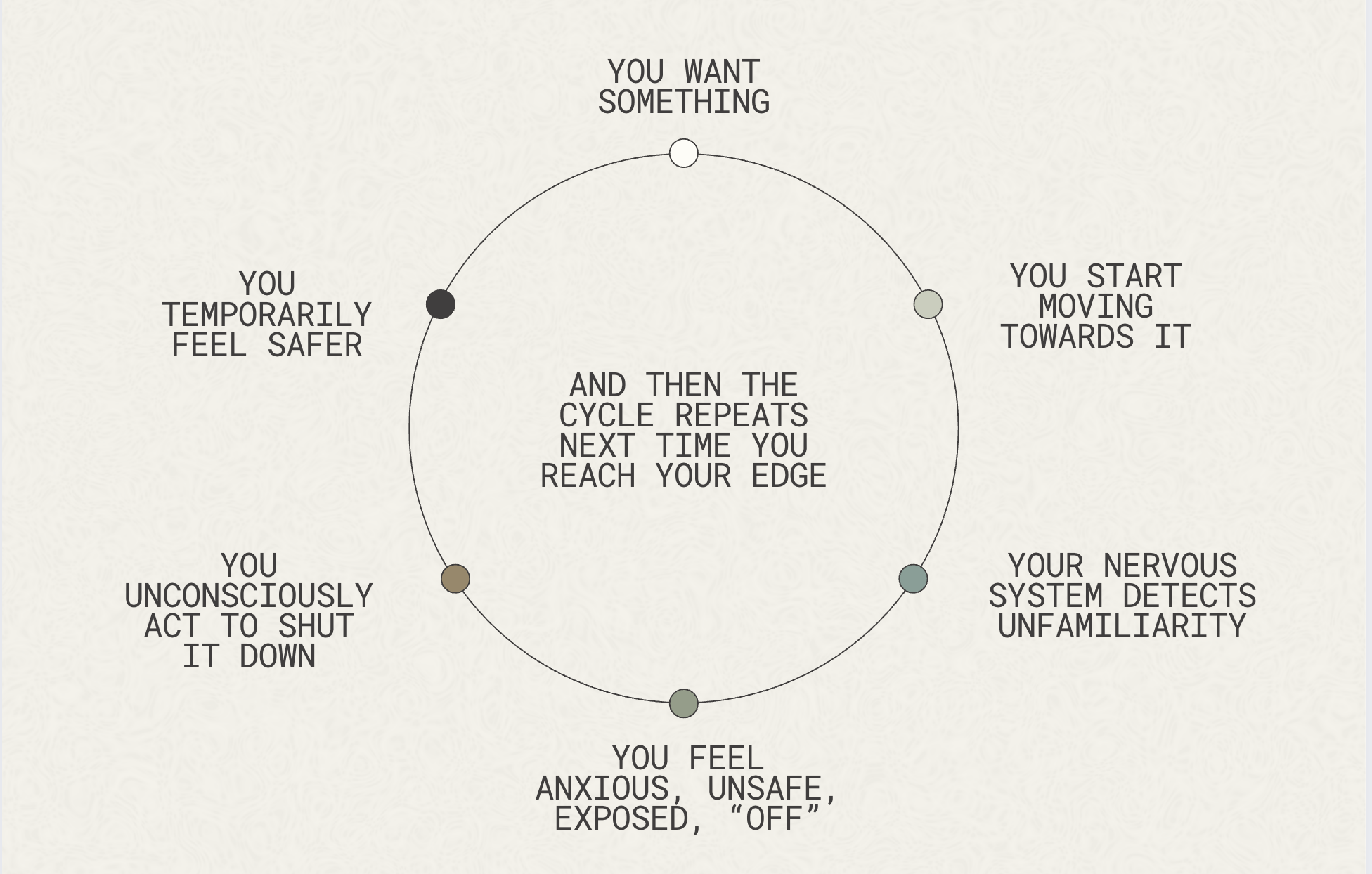The Self-Sabotage Cycle: Why You Shut Down Right Before Things Get Good
Ever found yourself this close to something you really wanted… and then suddenly ghosted your own growth?
Maybe you:
Missed a deadline you actually cared about
Avoided sending the pitch after weeks of planning
Said “yes” to something misaligned — just to keep the peace
Scrolled for three hours instead of submitting the thing that could change your life
You’re not lazy.
You’re not flaky.
And you’re definitely not alone.
What you’re probably running into is self-sabotage… not because you’re scared of failure, but because part of you is scared of what happens when things go well.
Let’s unpack this…
What Is Self-Sabotage?
At its core, self-sabotage is protection.
It’s a subconscious pattern designed to keep you safe from perceived threat… even if that “threat” is success, visibility, joy, or intimacy.
Psychologically, self-sabotage is the mismatch between what you want and what your nervous system believes is safe.
You can desire change and resist it at the same time.
And that resistance? It often shows up in sneaky, familiar ways.
Common Ways Self-Sabotage Shows Up
Let’s name a few to help you notice the patterns:
Procrastination masked as “I just need to feel more ready”
Perfectionism that keeps you tweaking the details instead of launching the thing
Overcommitting so you “don’t have time” to do what you really care about
Self-isolating when things get vulnerable or emotional
Picking fights, ignoring messages, or ghosting when things get too good
Shame spiraling after taking a bold step, then retreating to safety
In somatic terms, these are often your body trying to regulate itself — by retreating from discomfort, change, or potential rejection.
Because for many of us, success, rest, and visibility aren’t neutral.
They’re actually activating.
🧠 Why You Do This: The Behaviour Loop
Here’s how the self-sabotage cycle tends to unfold:
You want something: a new relationship, job, creative leap, more rest
You start moving toward it
Your nervous system detects unfamiliarity = potential danger
You feel anxious, unsafe, exposed, “off”
You unconsciously act to shut it down (scrolling, quitting, picking a fight)
You temporarily feel safer… but also stuck, disappointed, or ashamed
Cycle repeats next time you reach your edge
Sound familiar? This is where somatic work comes in. Because mindset shifts alone won’t interrupt a survival pattern rooted in the body.
🌀 How to Interrupt the Self-Sabotage Cycle
Let’s address something first: you don’t “fix” self-sabotage by pushing through it harder.
You interrupt it by getting curious about what your body is trying to say.
Here’s where to begin:
1. Start with awareness, not action.
When you catch yourself procrastinating, ghosting, or shrinking, pause.
Ask:
What just happened before I shifted into this behaviour?
What was I about to do?
What felt risky, unfamiliar, or vulnerable?
Somatic cue: Track what happens in your body when you hit the edge — does your chest tighten? Do you stop breathing? Does your stomach drop?
2. Name the protector, don’t shame it.
That part of you isn’t trying to sabotage you — it’s trying to protect you.
Your system just hasn’t updated the threat level.
Say: “Thank you for trying to keep me safe. I’m learning a new way now.”
3. Regulate first, then re-engage.
Before you force yourself forward, help your body down-regulate.
Try:
Grounding touch (hands to chest or belly)
Swaying side to side
Gentle breath (exhale longer than you inhale)
Orienting: name five things you see, feel, or hear around you
Then revisit the task or step from a more regulated place.
4. Celebrate micro-moves.
Nervous system safety builds through repetition not giant leaps.
Sending the email, making the call, staying visible… it all counts.
Celebrate that you didn’t run. That you stayed with yourself. That’s the work.
This Isn’t About Willpower. It’s About Safety
Moving through self-sabotaging behaviour doesn’t require you to “do more”. Instead, you need to create conditions where your body feels safe enough to stay.
And that’s exactly what we do in somatic coaching — help you build awareness, expand your capacity, and trust yourself again without abandoning your needs.
Ready to Move Differently?
📍 Take the free nervous system quiz to discover what state you're operating from
💬 Book a free intro call if you're ready to move from stuck to self-led



